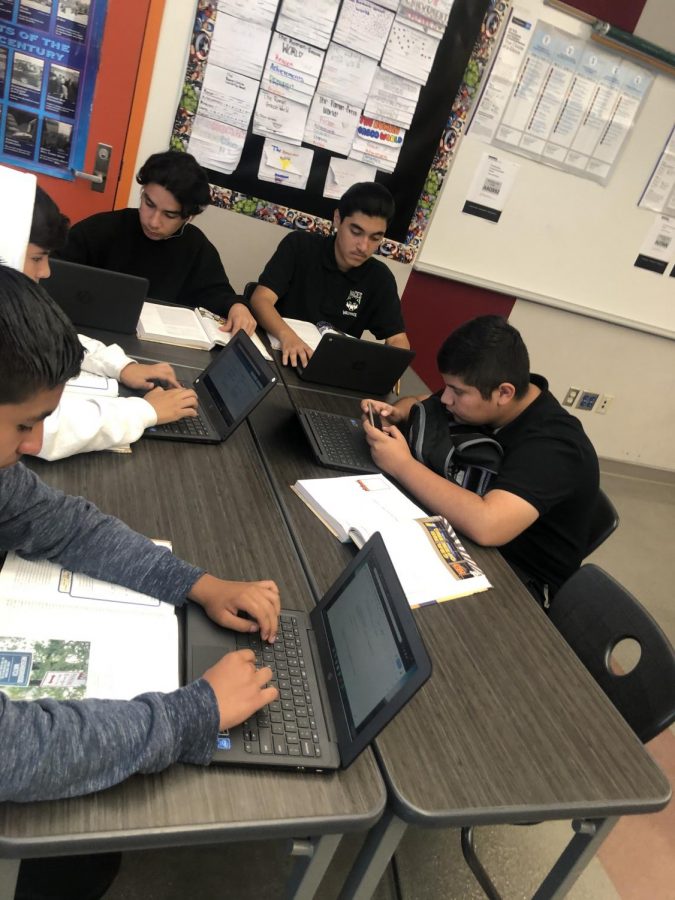Teachers vs Cellphones
October 30, 2019
A tool given to some tiny humans at the starting age of two. A tool that the tiny human grows up with, and learns how to live through the screen for the continuation of their lives. “What is your personal opinion on students having their phones in class?” This is a hard question for teachers who have also adjusted to the lifestyle of living behind a screen themselves.
The topic of students having phones in class is controversial to many, especially educators. Some teachers believe that they should be banned, others believe that they’re an escape that we just have to live with.
Some schools have students check their phones in to the assigned teacher for the entire day, and other schools, like this one, let students use and have their smart phones as they wish.
The main goal for teachers is to prepare their students for the real world outside of school. World History Teacher, Mr. Nolasco, Chemistry and Physics teacher, Ms. Perfecto, and Music Director, Ms. Rincon all believe phones shouldn’t be banned-and phones should be a bit more accessible. On the other hand, Chemistry and Astronomy, teacher Ms. Cotta believes that students shouldn’t have their phones allowed in class.
Nolasco believes students should be able to have access to their phone, but that they should be able to know how to use their technology wisely. Technology is a big part of today’s society, and it just isn’t something that some can identify without. “It’s an easy distraction. They’re not used to being without a distraction. They don’t know how to be bored. They’re also not comfortable with complete silence.” Nolasco’s phone rule is: if the phone becomes a distraction, it should be taken away and given back at the end of class. But, if the student is being constantly reminded to put it away the issue should be dealt with a parent. A distraction to education by getting attention residue, which makes it twice as hard to gain focus once again.
Perfecto believes that phones and technology is one way to prepare her students for the real world. “If you don’t know how to control yourself now your not going to be able to control yourself in college. Nobody’s gonna baby you to get off of your phone during the lecture.”
Perfecto is lenient about phones especially during her physics class. Her students told her about an application were they can make measurements through their phone, which is them finding ways to better their education. But, even though she knows that technology betters the education of students through Google docs, Google slides, etc…she knows the downside of her students using the phone which is to watch Netflix, Hulu, or Youtube. Her phone policy is that she gives one warning, and if the student gets a second warning she takes it and returns it at the end of the day.
Rincon is another teacher that believes that students should be permitted to have their phones in class. Social media and phones can be a great advantage especially in Rincons case. Rincon uses Instagram as a way to remind her students to become a better version of themselves, by practicing. She also believes that the technology on phones is a bit better, especially when she asks her students to submit videos.
Educators teaching students how to use their technology for the real world is creating digital citizenship. Rincon’s phone policy is that she first gives students the benefit of the doubt, then by the second warning she clearly realizes that the student is not capable of having that type of responsibility. “The reality is that phones are king. What are we gonna do, pretend that it’s not existent? That’s a losing battle.”
Cotta is one of the teachers who believes that students shouldn’t have their phone in class at all. San Mateo High School is a school that makes students lock up their phones and not have access to them all day, Cotta wishes MACES was the same. The consequences for students using their phone in class is not given by Cotta. She believes the consequence is a self-reflective consequence on the student’s grade.
A tiny consequence that might be taken in Cotta’s class is if a student is caught with a phone then it is taken and put in the phone jail until the end of class. “They don’t remember how to talk to people anymore. They communicate now with fake people instead of real people.” High school eras differ from Cottas due to not having a distraction as phones during class.
Although many teachers have different opinions on phone enforcing rules they all have one main goal. This goal is to prepare their students by either embracing the technology around them or helping them by not letting them have distractions during class.


